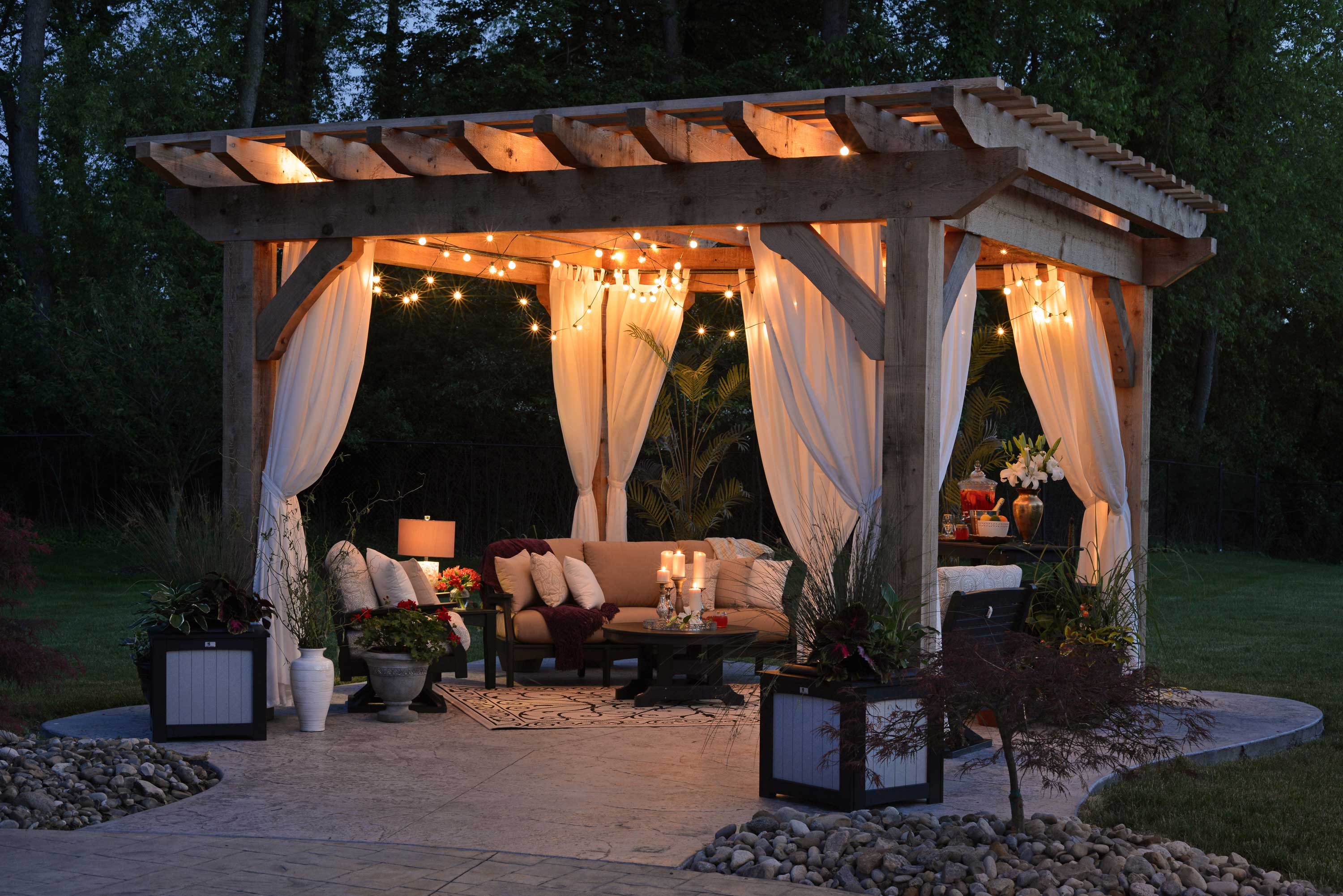Demand for outdoor living furniture and structures has taken off, especially in the wake of the pandemic. Berlin Gardens in Berlin, Ohio, uses an aggressive lean manufacturing strategy and speedy turnarounds to capture that demand efficiently, but it wasn’t until the company adopted a full enterprise resource planning (ERP) program that it really felt in control.
Founded in 1988, Berlin Gardens manufactures outdoor living products that include outdoor structures (gazebos, pavilions and pergolas), a variety of polyethelene furniture, and a wide assortment of outdoor fabrics to complement the furniture pieces.
Berlin Gardens styles itself as an environmentally responsible business and makes its outdoor furniture products from recycled, high-density polyethylene. These poly products – which include chairs, tables, A-frames, outdoor bars, picnic tables, benches, arbors, and more – are all made by skilled Amish craftsmen. Combining old-world artistry with modern technology and materials, the company specializes in outdoor furniture designed to be attractive, durable and environmentally friendly.

Going lean
Berlin Gardens implemented Six Sigma lean manufacturing procedures to improve operations and make better use of limited production space. But an outdated business management system led to scheduling, inventory management and other shop floor problems. To address those challenges, they turned to Global Shop Solutions ERP software.
“Our biggest challenge was the way we scheduled work orders,” recalls Owen Yoder, IT/Systems Manager for Berlin Gardens. “We also did a lot of duplicate data entry for tracking materials and scheduling. We wanted a one-stop shop with inventory control, accounting, scheduling and everything else, and Global Shop Solutions offered an all-in-one integrated system.”

Short lead times
Lean manufacturing enables Berlin Gardens to offer a two-week lead time for its furniture orders and three to four weeks for outdoor structure orders, building products only two days before shipping them.
In the past, production schedules were based on sales order due dates. Now, planners use the Advanced Planning and Scheduling feature of the ERP system to generate work orders automatically and schedule all new jobs.
“One of the reasons we chose Global Shop Solutions is the ability to create work orders aside from the sales orders,” says Yoder. “With the work orders driving production, we can build to stock, but only what we need to ship.”
He says the system also lets them run the auto work order generation with cutoff dates. That provides better visibility of capacity by work center. For example, if they exceed capacity on any given day, they can shuffle work orders and move up production for certain jobs based on which specific work centers are overloaded.

Reducing raw materials inventory
Most of Berlin Gardens’ vendors can’t match their two-week lead times. That forces the company to order raw materials ahead of time, which creates purchasing and inventory management challenges.
The auto reorder point feature in the ERP program allows them to automatically order raw materials, ensuring they always have enough on hand while still meeting customer demands. It has also lowered raw material inventory and associated carrying costs.
“We set our raw materials reorder points high enough so that we have a week’s supply on hand at all times,” says Yoder. “We run auto purchasing every day, based on order-entry cutoff dates. Auto purchasing looks at the orders entered yesterday and lets us know if any materials have fallen below the reorder point. If so, we purchase based on that data. With Global Shop Solutions, we’ve reduced raw materials inventory by 20 percent without disrupting our two-week lead time.”
Saving time
Another challenge Berlin Gardens faces comes from all the customizable options offered with their outdoor structure products. Previously, this required making a lot of different parts and keeping them in inventory to cover all the possible options for each item.
Now, instead of having to maintain a large inventory of component parts and manually create the bill of materials for each new order, they use the ERP software to create each BOM in minutes.
“This has been huge for us,” says Yoder. “When entering an order, we simply select the options and Global Shop Solutions creates the material list, generates the work order, and schedules everything – saving about 20 minutes per work order. Considering we average 25 structure work orders per day during peak season, the time savings are significant.”
Yoder also appreciates the ease of customization within Global Shop Solutions. In addition to creating custom reports using Crystal Reports, he also has downloaded custom applications from Global Shop Solutions’ online ARC store where customers have access to more than a thousand free custom applications.
One custom report tracks the number of pieces of furniture scheduled at each work center each day. Another shows the shipment schedule for structure products in a calendar format, displaying what orders are scheduled to ship on what day, color coded by shipment. Both play an important role in ensuring that Berlin Gardens maintains its two-week production lead times.
“With Global Shop Solutions, we have complete visibility of all job requirements,” says Yoder. “This allows us to produce exactly the amount of pieces on order, which helps get the product out the door on time.”
Real-time costing
The program also helps Berlin Gardens better track job costs and adjust pricing by automatically averaging inventory part costs when raw materials prices change.
“Before, we managed all pricing on spreadsheets,” recalls Yoder. “To review pricing, we had to analyze the spreadsheets to figure out exactly what we were paying for our materials and then manually update it. This gave us a cost, but one that was based on what we were purchasing at the time. Global Shop Solutions gives us a more accurate cost in real time, and we don’t have to do anything to update it.”
Leaner, more efficient
Yoder says that combining the lean manufacturing initative with the ERP software helps Berlin Gardens achieve productivity and efficiency gains in virtually every area of the business.
“One of our big competitive differences is the ability to maintain a short lead time that customers can depend on,” says Yoder. “Having accurate costs at our fingertips enables us to offer competitive prices. Global Shop Solutions even helps manage our off-season workload, when we make a lot of small inventory parts for use during our busy season. Tracking inventory usage helps us control those costs by knowing how much to make and when.”
The software also helps Berlin Gardens maintain a lean staff. Although headcount hasn’t been reduced, the company gets more done with the same amount of people. Since implementing the software, the company now performs scheduling and purchasing with only one person for each function.
“I love all the different ways the software lets you build systems and get things done faster and more efficiently,” he says. “The folks at Global Shop Solutions are knowledgeable and responsive. And if the system doesn’t do something you want it to, they’ll work with you to find a way to get it done.”
For more information about Global Shop Solutions, visit globalshopsolutions.com.







Have something to say? Share your thoughts with us in the comments below.